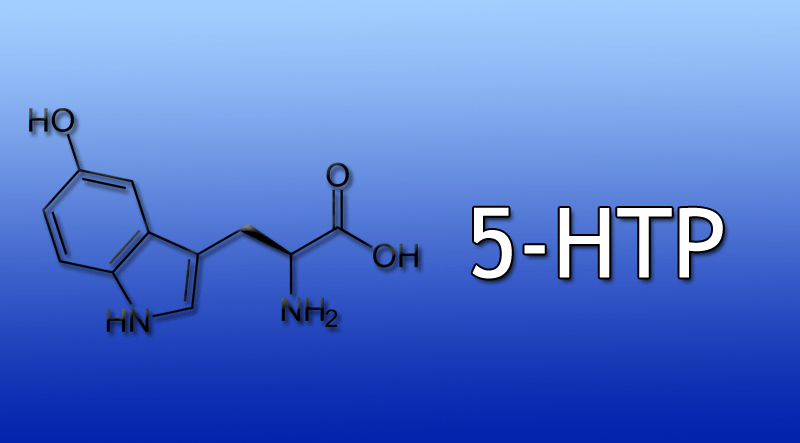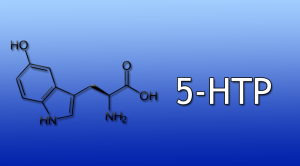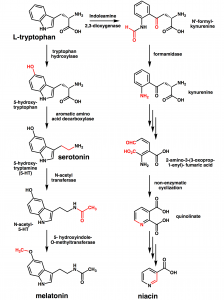Last updated on September 22nd, 2016 at 12:06 am
5-HTP is a naturally occurring amino acid that is a direct precursor to serotonin. It is the metabolite of L-Tryptophan and a precursor to melatonin.
Table of Contents
Benefits
Being a direct precursor to serotonin, 5-HTP helps increase serotonin levels in the brain. It is derived from L-Tryptophan, an essential amnio acid found commonly in food. Below is a list of foods rich in Tryptophan from highest to lowest:
- White eggs
- Dried spirulina
- Atlantic dried cod
- Raw soybeans
- Parmesan cheese
- Sesame seeds
- Cheddar cheese,
- Sunflower seeds
- Pork chop
- Turkey
- Chicken
- Beef
Tryptophan goes through a series of steps in order to become 5-HTP, which is then converted to serotonin which is then converted to melatonin. Melatonin is a neurotransmitter as well as a hormone that is responsible for maintaining the body’s circadian biological clock. Because of this, melatonin is regarded as a sleep hormone. Turkey has a status of inducing sleepiness or sedating an individual after consumption due to its Tryptophan content, however, this is not true and is usually the result of overeating.
Side Effects of 5-HTP
5-HTP is remarkably safe for consumption in humans and there have been no published reports in which it caused serious side effects. It is important to note that Tryptophan, which is commonly found in foods and an essential amnio acid, is a precursor to 5-HTP and that most people get around 1 g of it everyday from diets alone. 5-HTP supplements are commonly found in 50 to 100 mg doses. At these doses, side effects are rare. At higher doses, however, symptoms of too much 5-HTP become apparent:
- Fast heart-rate
- Feeling faint
- Fever
- Diarrhea
- Difficulty walking
- Sweating
- Muscle spasms
If you experience any of these side effects, stop supplementing for a week and call your doctor if the effects persist.
How 5-HTP works
5-HTP works by increasing serotonin levels in the brain and in the body. When supplemented, part of it is metabolized in the liver into serotonin through the enzyme aromatic-L-amino-acid decarboxylase and with Vitamin B6. Serotonin itself cannot cross the blood-brain barrier and thus cannot increase serotonin levels in the brain, but the remaining 5-HTP that was not metabolized can cross the blood-brain barrier. There, it is converted into serotonin which causes an increase in serotonin levels in the brain.
Increased serotonin levels in the brain helps to alleviate depression, improve mood, reduce anxiety, and suppress appetite. Serotonin is also a precursor to melatonin, the sleep hormone and neurotransmitter. Due to this, 5-HTP can enhance sleep and reduce insomnia by increasing melatonin in the brain and the body.
Dosage and how to take 5-HTP
Start by taking 50 mg of 5-HTP and take note of its effects on you. After a week or so, increase your dose to 100 mg. Again, take note of the effects it has on you. If you still don’t feel anything from it then increase it by 50 mg every week until you feel the effects. Do not exceed 500 mg of 5-HTP daily. If at any time you experience side effects then lower the dose until they disappear. If the side effects persist then call your doctor and stop taking 5-HTP.
Where to buy 5-HTP
You can buy 5-HTP from a majority of online health supplement stores and even at the local pharmacy.
Visit the Where to Buy Nootropics page to locate an online nootropic vendor that stocks 5-HTP.
References
1. Wolfgang Pühringer, Anna Wirz-Justice, Ioana Lancranjan, Mood elevation and pituitary stimulation after i.v. l-5-HTP in normal subjects: Evidence for a common serotoninergic mechanism, Neuroscience Letters, Volume 2, Issue 6, August 1976, Pages 349-354, ISSN 0304-3940, 10.1016/0304-3940(76)90173-7. <http://www.sciencedirect.com/science/article/pii/0304394076901737>
2. RenéS. Kahn, Herman G.M. Westenberg, L-5-Hydroxytryptophan in the treatment of anxiety disorders, Journal of Affective Disorders, Volume 8, Issue 2, March–April 1985, Pages 197-200, ISSN 0165-0327, 10.1016/0165-0327(85)90046-1. <http://www.sciencedirect.com/science/article/pii/0165032785900461>
3. Ceci, F., C. Cangiano, M. Cairella, A. Cascino, M. Del Ben, M. Muscaritoli, L. Sibilia, and F. Rossi Fanelli. “The Effects of Oral 5-hydroxytryptophan Administration on Feeding Behavior in Obese Adult Female Subjects.” JOURNAL OF NEURAL TRANSMISSION 76.2 (1989): 109-17. SpringerLink. Web. <http://www.springerlink.com/content/hkk7n4524269453u/>.
4. TC, Birdsall. “5-Hydroxytryptophan: A Clinically-effective Serotonin Precursor.” Alternative Medicine Review 3.4 (1998): 80-271. National Center for Biotechnology Information. Web. <http://www.ncbi.nlm.nih.gov/pubmed/9727088>.
5. R.J Wyatt, V Zarcone, K Engelman, W.C Dement, F Snyder, A Sjoerdsma, Effects of 5-hydroxytryptophan on the sleep of normal human subjects, Electroencephalography and Clinical Neurophysiology, Volume 30, Issue 6, June 1971, Pages 505-509, ISSN 0013-4694, 10.1016/0013-4694(71)90147-7. <http://www.sciencedirect.com/science/article/pii/0013469471901477>



